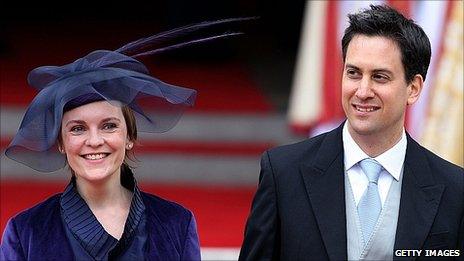Why do people get married after having children?
- Published
- comments

The happy couple already have two children together
Labour leader Ed Miliband and his long-term partner Justine Thornton are due to get married. They already have two children, so why get hitched?
For many people having a child is the ultimate commitment to a partner. A life you have created together and are responsible for raising.
It's a commitment many people make without getting married. But some then go on to tie the knot, like Ed Miliband and his partner of six years, Justine Thornton. Why?
There are the obvious financial and legal advantages to getting married. For older people issues surrounding pensions and inheritance are often the reason they decide to get hitched after years together. But Miliband and Thornton are still young.
And while the pressures on the leader of the Labour party will be slightly different to those of the average person, there is no mistaking that attitudes to marriage and family have changed. Getting married used to be about sex, living together and having children, but research shows this is no longer the case.
According to the latest British Social Attitudes (BSA) Survey, which was conducted in 2008, almost two-thirds of people now see little difference between marriage and living together. Fewer than a fifth of people took issue with it.
Just under half thought cohabitation showed just as much commitment as getting married. When it comes to children, where opinion can often be a bit more traditional, only 28% said they believe married couples make better parents.
So why do it? Psychologist Donna Dawson, who has specialised in sex and relationships, says it is often about making a public statement.
"Having the children take part is like a ceremonial creation of a family and a public statement that they are all in it together. It's very much a 21st Century ritual, which more and more people will be doing."
She says even when couples say there isn't a specific reason, there is "always something going on underneath".
"Sometimes it is about marking a different stage in a relationship, or they might have taken a long time because of the bad example they were set by their own parents. There is usually a reason, even if they are not fully aware of it."
Chris, 41, and his partner were together for nine years and had two children when they got married. He didn't feel any direct pressure from his partner or family, but says as his children got older he wanted them to have parents who were married.
"For me a big part of it was the children," he says. "I didn't want them to be asked at school why their parents weren't married. I suppose you could say that was me feeling a slight pressure to conform to social norms, but if I hadn't wanted to get married in the first place I definitely wouldn't have done it."
But people who get married after having children could actually be the traditionalists. Historically, the UK has a long tradition of informal "marriages" that were recognised by the community, says Penny Mansfield, director of the relationship research organisation One Plus One.
'Golden age'
"If you cohabited or had children together you were as good as married in everyone's eyes. It's only after the introduction of the Hardwicke Marriage Act in 1753 that marriage became a legal concept and unmarried couples became stigmatised."
She says the "golden age" of marriage was as recent as the 1960s and 70s, when more people got married than ever before. Marriage was seen as a passport to adulthood, when you were allowed to have sex and live together.
"Obviously, people wanted that freedom as soon as they could," says Mansfield. "The average age of people getting married was 21 for women and 23 for men. Now you can put a decade on those ages and that's because sex and cohabitation outside of marriage are largely accepted.
"Now I think people get married after the house and kids because it is very much a public celebration of what they have, rather than the passport to adulthood."
Guardian columnist Zoe Williams has been with her partner for six years and has two children - just like Miliband and Thornton - but says she thinks it is a "weird gesture" to get married at this stage.
"It's now socially acceptable to have sex, live together and have kids outside of marriage, so why spend £10,000 or more on a wedding?" she says.
"Having kids is a much bigger deal than marriage, a much bigger statement of commitment. Personally, I just don't think about getting married. I simply have never felt a need to be married."
In the end it could all be about having a big party for Ed and Justine. According to BSA survey, 53% of people now think a wedding is more about a celebration than a life-long commitment.